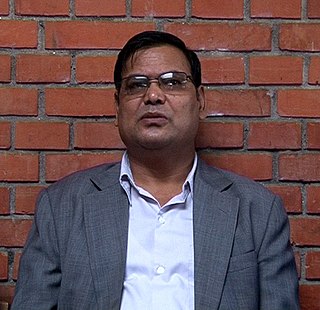
The Communist Party of Nepal was one of the two major communist parties in Nepal from 1991 to 2018. The party was formed in January 1991 with the unification of the Communist Party of Nepal (Marxist) and the Communist Party of Nepal (Marxist–Leninist).

Rastriya Janamorcha is a communist political party in Nepal. It was originally founded in 1995 as the legal front of Communist Party of Nepal (Masal). It was refounded again in 2006 after breaking away from Janamorcha Nepal and has acted as the legal front for the Mohan Bikram Singh led Communist Party of Nepal (Masal).

Krishna Bahadur Mahara is a Nepalese politician, belonging to the Nepal Communist Party (NCP).He was a prominent Maoist leader during the civil war. After the maoists entered the peace process, he was elected to parliament/constituent-assembly multiple times, and also became cabinet minister. Following his election to the house of representatives in the 2017 legislative election, he was elected House Speaker but resigned in October 2019 after allegations of attempted rape were made by a parliamentary staffer. He was acquitted in February 2020.
Kedar Nath Upadhyay was a Nepalese judge who served as 14th Chief Justice of Nepal, in office from 6 December 2002 to 21 January 2004. He was appointed by the then-Prime Minister of Nepal, Girija Prasad Koirala.
Events from the year 2010 in Nepal.
Events from the year 2009 in Nepal.

The Provincial Assembly of Gandaki Praadesh also known as the Gandaki Pradesh Sabha, is a unicameral governing and law making body of Gandaki Pradesh, one of the 7 Provinces in Nepal, and is situated at Pokhara, the province capital of Gandaki Pradesh, with 60 Members of the Provincial Assembly (MPA).
Communism in Nepal traces its roots back to the pro-democracy movement of 1951, and the subsequent overthrow of the autocratic Rana regime and the establishment of democracy in Nepal. The communist movement in Nepal has split into factions multiple times and multiple factions have come together into a single fold at times as well. It has a history of getting banned from open political discourse; as well as multiple instances of embracing guerrilla insurgency, most notably, the Maoist insurgency in the 1990s and early 2000s that led to the Nepalese civil war, claiming at least 15,000 lives. After the Maoists and other main political parties formed a united coalition, launching a successful peaceful civil resistance against the dictatorial coup d'état by the monarchy, which resulted in the abolition of the monarchy and drafting of a new constitution affirming Nepal as a secular, federal, democratic republic striving towards democratic socialism, the two main communist parties of Nepal contested the first election according to the new constitution as a coalition, eventually leading to the unification of two parties with a strong majority in the federal parliament as well as six out of seven provinces of Nepal.
Govinda Bahadur Shrestha was the Chief Justice of Nepal from 22 January 2004 to 13 January 2005.
Anup Raj Sharma was the Chief Justice of Nepal from 11 February 2010 to 25 March 2010. He was preceded by Min Bahadur Rayamajhi and succeeded by Ram Prasad Shrestha. He was appointed chairperson of the National Human Rights Commission (NHRC) in 2014.
Damodar Prasad Sharma was the Chief Justice of Nepal from 11 April 2014 to 19 October 2014. He was preceded by Khil Raj Regmi succeeded by Ram Kumar Shah.
Kedar Prasad Giri was a Nepalese judge who served as 18th Chief Justice of Nepal, in office from 5 October 2007 to 7 May 2009. He was appointed by the then-king of Nepal, Gyanendra.
Hari Prasad Sharma (1940-2018) was a Nepalese judge who served as 16th Chief Justice of Nepal, in office from 14 January 2005 to 29 July 2005. He was appointed by the then-king of Nepal, Gyanendra.
Om Bhakta Shrestha was a Nepalese judge who served as 11th Chief Justice of Nepal, in office from 12 September 1997 to 12 April 1998. He was appointed by the then-king of Nepal, Birendra.

Surendra Prasad Singh is a Nepalese judge who served as 9th Chief Justice of Nepal, in office from 26 September 1995 to 14 February 1997. He was appointed by the then-king of Nepal, Birendra.
Nayan Bahadur Khatri was a Nepalese judge who served as 6th Chief Justice of Nepal, in office from 8 December 1976 to 10 December 1985. He was appointed by the then-king of Nepal, Birendra. He was the longest serving Chief Justice of Nepal. He died on May 24, 2019.

Sir Ratna Bahadur Bista was born in Dadeldhura to an aristocratic family that was given land grants in Sudurpashchim Pradesh circa 1911 A.D during a hunting trip by King George V of the United Kingdom and Chandra Shumsher Jang Bahadur Rana the Prime Minister of the Rana Dynasty. He went on to become the 5th Chief Justice of Nepal, in office from 26 July 1970 to 6 August 1976. He was appointed by the then-king of Nepal, Mahendra. He was responsible for the Summary Procedure Act 1971. The Committee that he established recommended for the establishment of High Courts in different regions which resulted in the creation of a four tiered judicial structure with one additional tier in the middle- "the Regional Courts."
Hari Prasad Pradhan was a Nepalese judge who served as 1st and 3rd Chief Justice of Nepal, in office between 10 August 1951 and 20 May 1956 and 14 December 1961 and 15 December 1963. He was the first Chief Justice of Nepal and the only jurist to hold the position for two terms. He was also the Chief Justice to allow woman lawyers in the country.





